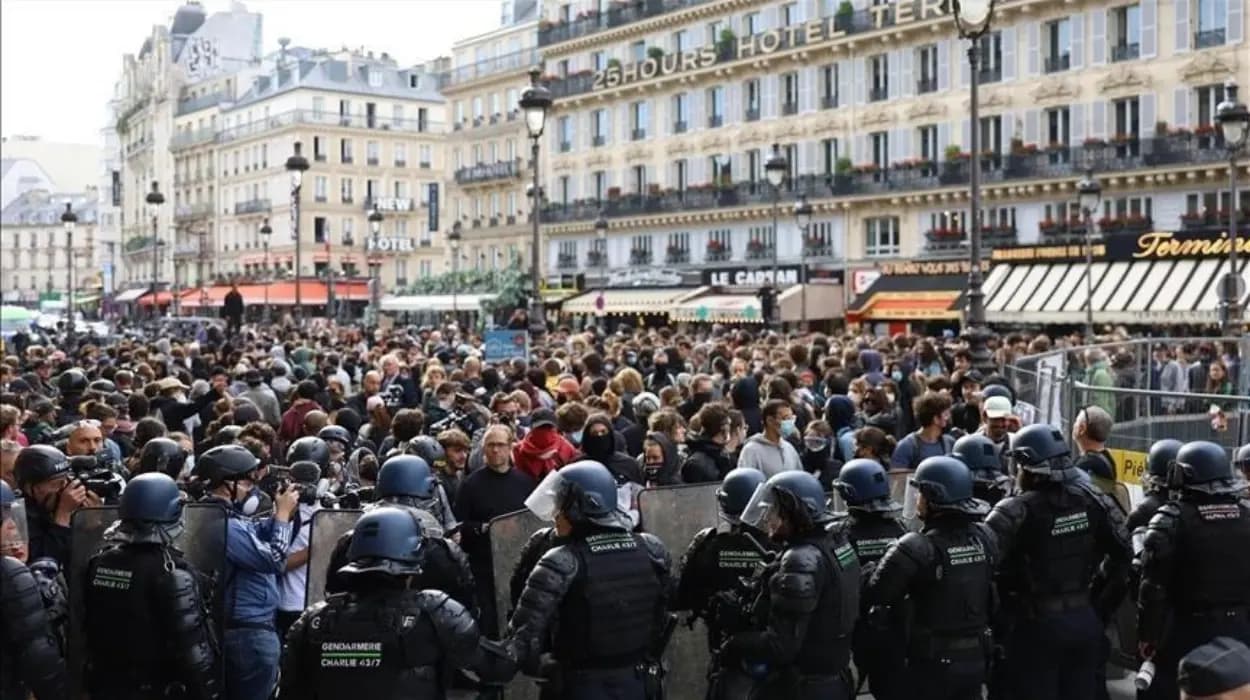France braces for nationwide strikes Thursday as unions and
opposition parties rally against Prime Minister Sebastien Lecornu’s budget
proposals.
With 76,000 police officers and gendarmes stationed nationwide, including 5,000 in Paris, nationwide strikes began.
According to the broadcaster BFM TV, about 20 people tried a roadblock in Lyon in the early hours of the morning, but it was swiftly broken up, leading to two arrests.
Blockades in Bordeaux and Montpellier high schools were reported.
A school in Bordeaux's west was blocked by several hundred high school students who were yelling, "Macron resign."
Additionally, a number of processions left from Saint-Nazaire, Nantes, and Marseille.
The Education Ministry reports that 6.42% of teachers are on strike, but the major secondary school union, Snes-FSU, reported a 27% walkout in middle and high schools.
Following a heated meeting with Lecornu, France's major trade unions and left-wing opposition groups demanded a statewide strike on October 2. They claimed that Lecornu had not complied with their requests about budget suggestions.
"Sebastien Lecornu must be censored," the La France Insoumise (LFI) parliamentary group said, calling on other left-wing organizations to sign a combined motion of censure. The motion will be made at the start of the parliamentary session, according to LFI.
On BFMTV, the Communist Party, Socialist Party, LFI, and the Ecologists declared their intention to participate in the demand for a strike.
Trade unions and the "Block Everything" movement, which attracted about 197,000 participants nationally, inspired 1 million people to participate in the nationwide protests on October 18, which sparked the current strikes.
Former Justice Minister Eric Dupond-Moretti warned of “a
security drift” under Lecornu’s government.
“If the executive tries to take control of justice, we are moving from democracy to totalitarianism,”
he said.
Current Justice Minister Gerald Darmanin responded through the US social media company X, saying:
“The security of the French people is indeed my absolute priority. To this end, I am firmly restoring order, without naivety or excess, to the functioning of our justice system and our prisons.”
The richest people and companies will be required to contribute to the 2026 budget, government sources informed BFM TV at the same time.
Officials claimed the initiative will target individuals with extremely high incomes and assets without compromising their ability to make investments, even though they are ruling out a "Zucman tax."
Emmanuel Macron, the president, supported Lecornu's cautious approach to cabinet formation.
Marine Le Pen and Eric Ciotti, the head of the Union of the Right for the Republic (UDR) parliamentarians, condemned the proposed taxation of the wealthiest.
“Taxing the tool of work, it’s madness,”
Ciotti told TF1,
accusing the government of pursuing “a far-left ideology.”
He warned that such measures would drive wealthy taxpayers and investors out of France.
How will transportation services be affected nationwide?
There are partial or complete stoppages of public transit
services in various areas of the country. For example, the Eiffel Tower is
closed to the public, and numerous bus and subway lines are either reduced from
their normal schedule or have been canceled altogether.
Large French train operators, including SNCF, are warning of significant delays and cancellation of services. The strikes are expected to have widespread effects on TGV line services, the regional train system, and local suburban commuter service.
Although air travel in France is relatively unaffected, some regional airports are reporting delays to flights due to insufficient staff when strike action occurs. Similarly, freight and logistics companies at ports are experiencing slight delays.
